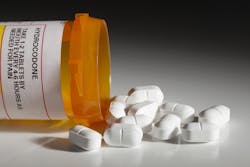Sincerely Stefanie: We Need More Sympathy
Gary Mendell’s son Brian, like many kids in middle school, was curious about marijuana and tried it. That one day led to an eventual addiction to far more dangerous drugs in a search for a new, stronger high each time.
With tears in his eyes and a shaky voice, Gary spoke to attendees at the National Safety Congress in Indianapolis and told us about Brian’s downward spiral. Brian tried as hard as he could to kick his habit by going through eight different treatment programs. Eventually, at the age of 25, he died by suicide.
Throughout the Mendell family’s emotional, stressful journey with addiction, Gary says Brian was treated as an outcast, and effective, science-based treatment was hard to find.
“They say those with this disease have a character flaw,” he told the audience. “Those who suffer from substance abuse are ridiculed, stigmatized and outcast. We need to prevent and treat it with love and empathy and scientific evidence.”
In the workplace, addiction can be hidden, and the stigma associated with this deadly, dangerous habit needs to take a backseat when getting treatment for this disease is paramount to the safety of your workforce.
Eric Goplerud, vice president, National Opinion Research Center at the University of Chicago, echoed similar sentiments to the audience.
“We’re not attending to it as a real disease with real people,” he said. “These people are your family, your workplace family or from your church. They deserve as much sympathy as they do good treatment.”
Prescription drug abuse has a devastating impact on the workforce. Workers struggling with substance abuse miss 50 percent more days than their peers, Goplerud pointed out. In addition, they also miss an average of 29 work days per year, or three times the average amount of missed days.
The cost to employers, he told attendees, ranges depending on the industry. The costs of missed work vary from $187 to $3,941 per employee annually, and excess job turnover per capita could be upwards of $4,000.
A recent National Safety Council (NSC) survey indicated that 7 in 10 employers have felt the impact of prescription drugs in the workplace, and that negative impact ranged from missed days, decreased performance, near misses, health costs and injuries.
“A lot of people don’t realize that just because it’s been prescribed by a doctor that it may not be safe [to take and] drive or work,” said Tess Benham, the NSC program manager who is responsible for developing, implementing and evaluating programs to prevent prescription drug overdoses.
One of the solutions, she suggested, is to train your workers. Being proactive is key, she said. Do not only train them to identify the signs of substance abuse. Tell them about how dangerous it is to use prescription drugs. Tell them about the consequences. Help your workers understand that drug abuse is a disease.
Next time you’re reading on your local paper’s web site, take a look at an article about NARCAN, a drug overdose or one substance abuse in general. If you want to know what’s wrong and why this epidemic continues plague our nation, this is the place to go.
Most of the comments show the stigma is real, and that few people have compassion. How many keyboard warriors hidden behind anonymous names write things like, “Oh they’re just a junkie. They’re better off dead,” or “It’s not a disease. It’s a choice. Why are we as taxpayers paying for this person?”
These are real people. These are real families. This is a disease, and substance abuse should be treated as such. And that’s not happening right now.
Once we’re able to treat people with compassion and care, we can get to the root cause of this epidemic. We can support additional evidence-based research and programs that can lead to more access for treatment programs for workers. After all, are we not our brother’s keeper?
